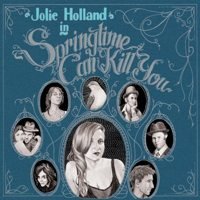Jolie Holland's third album finds the singer hitting her stride as a musician, an arranger and a songwriter. Her beginnings on Catalpa found her experimenting with folk and vocal jazz, mixing the two in what felt like a natural extension of the relaxed, airy atmosphere of San Francisco. Escondida honed her amazing voice, giving it range and definition along with some poppier, while still very organic, songs. The singer grew very naturally between the two albums, an expansion that seemed comfortable, yet ambitious. While it may not possess as many instantly catchy songs like "Old Fashioned Morphine" on Escondida, Holland is moving forward admirably as a musician, blending in a strong blues and roots influence into her already impressive repertoire.
Springtime Can Kill You follows naturally yet again, seeing the artist expand her horizons to a fully realized, fully connected album. Not that her previous efforts were merely compilations of disparate tracks, but they were at their core, a selection of tracks with no underlying thematic connection. Springtime changes all that, incorporating all twelve tracks into a tapestry of beautiful melodies, haunting stories and lustful dirges. Don't let any stigma about concept albums get in your way, however. Each track stands on its own and the album contains some of Holland's best work in her specially crafted niche of vocal jazz mixed with folk, blues and of course, pop.
The true star of Holland's work is her voice, of course. In attempting to describe it, I often feel as if I'm over-shooting by referencing other great female leads such as Nina Simone, Ella Fitzgerald or June Carter, but it's the only frame of reference I know for a voice that is as unique as hers. Her range goes from a throaty, solid contralto up to her peaks in the soprano range at times. Her delivery draws from the generation of beat poets who focused on the style of their rhythms as much as they did the quality of their voices. In short, it's something completely different from what you'll hear listening to the vast majority of other music.
The non-vocal music aspects to this album continue a similar thread from earlier albums: loose jazz drumming, a mix of traditional instruments such as accordion and fiddle and a solid backing bass. It's an almost frighteningly picturesque union of voice and music that they have achieved here. Brian Miller, Keith Cary and Dave Mihaly provide the core of the backing band, sounding tight and crisp but knowing when to loosen up and let it simply flow when need be. In many ways this album captures that now worn out term "Americana" but without feeling revivalist. Instead, it all sounds fresh, new and inventive, leaving you wondering what will pop out of your speakers next.
Springtime is an album made for a sunny day with a bit of melancholy. Drink a few beers, smoke some pot, go lay down on some grass or on the floor of your bedroom. Spin this record for hours on end. It will engulf you, cradle and comfort you. The songs on this album touch that part in us that is bittersweet yet hopeful and massages it with a therapeutic touch. I can't say you'll come away feeling fantastic, but you'll have been glad to have listened.
